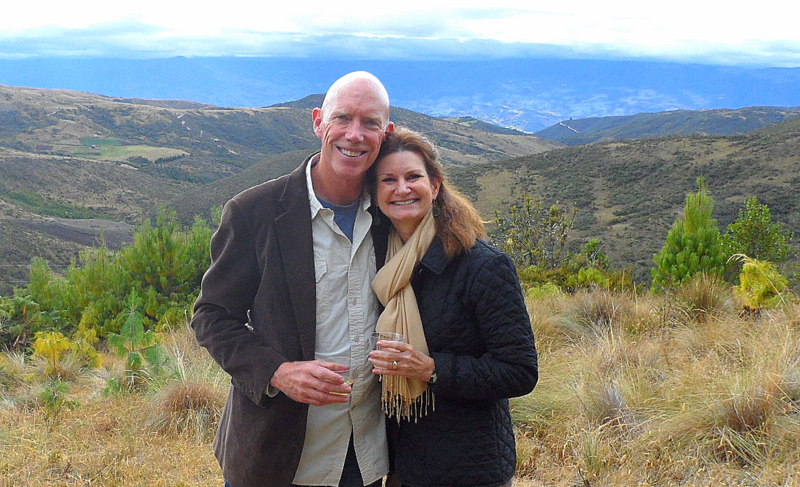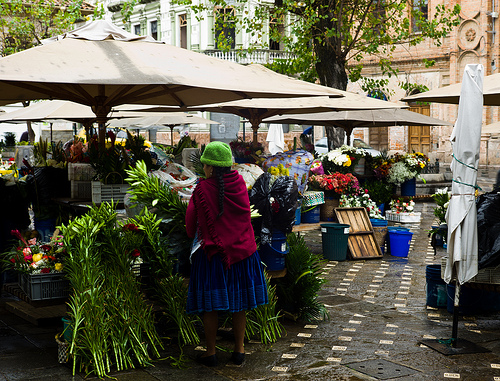
By Edd Staton, InternationalLiving.com
This article comes to us courtesy of InternationalLiving.com, a leading authority on how to live, work, invest, travel, and retire better overseas.

Author and Wife Cynthia
Photo by Edd Staton, InternationalLiving.com
Whether coming with suitcases or loading a container, people relocating abroad fret about what to bring along on their new adventure. Precious keepsakes, favorite books and photos... there's only so much room.
Well, I can recommend eliminating one thing. In fact, if you refuse to discard this particular item, your expat experience will almost certainly be disappointing. Let me explain... I ran into an acquaintance at an art exhibit recently whom I hadn't seen for quite some time. When we first met she had just arrived in Cuenca, and by her own admission she was run-down and seriously overweight. Now -- less than a year later -- I had to look twice, because I hardly recognized her.
The excess pounds had vanished and she was now attractively slim. But, beyond that obvious difference, I couldn't help but notice how she just seemed to glow. I remarked on her transformation and asked what was going on in her life to cause such a radical improvement. She responded with the usual checklist: more walking, eating better... But when she also mentioned lack of stress I was caught off guard.
After almost three years in Ecuador, I realized that the word "stress" is no longer part of my vocabulary. A stressful situation for me now is if the grocery store is out of my favorite cereal. Pretty lame stuff compared to the constant pressure and tension that defined my world before I moved overseas.
Cuenca, Ecuador
Photo by Hugo Ghiara, InternationalLiving.com
When we consider relocating abroad, we often focus on tangible benefits like a lower cost of living and excellent weather. After all, who doesn't want to rid their lives of financial concerns and knee-deep snow? Less obvious is the chance to experience life in a whole new way, free of the emotional baggage that often accompanies pursuing careers, raising families, and accumulating material possessions.
Stress is referred to as the "silent killer." Studies show that scores of maladies are stress-related, some life-threatening and many more life-shortening. Stress often becomes a habitual response that creeps into every aspect of daily life. Even vacations.
My wife and I were recently at an eco-lodge in northern Ecuador, and our hiking and dining companions were two couples from Canada, all with careers as hard-charging attorneys. Being around them constantly for several days gave us a rare and revealing glimpse into the life we left behind.
No sooner would we finish an excursion than one of them would say, "OK, before we break up we need to decide what we're doing next and when we're going to do it." Huh? We really need to do that?
At first we dutifully showed up on time, only to find them all there early and waiting on us. We progressively arrived at the "next thing" a little later, until we finally blew off a slide show about Andean bears, opting instead for a bottle of wine and a trip to the Jacuzzi.
These were delightful people whose company we enjoyed. But their relentless pursuit of busy-ness made us realize that one's whole approach to life can actually generate stress. And that we've been transformed by immersing ourselves in a culture that celebrates the present more than the future.
For example, we were taught in school that mañana means "tomorrow." Throughout Latin America, the word is more correctly translated as "not right now." This lack of specificity about the future is one of the most maddening cultural aspects for newly-arrived and time-sensitive expats. Yet, as you learn to release your death grip on rigid scheduling, you discover that those roses you never stopped to smell before in fact have an intoxicating aroma.
Stressful situations rarely happen to me now. And that's because I rarely set the clock, have no rush-hour commute (or car), and I have no job, boss, yard work, projects, or schedule. Sometimes I'm not even sure what day it is (the date, not the name -- retired life isn't that laid back!). Stress is a choice. Something happens. You decide, instantaneously and often unconsciously, what it means to you and what you are going to do about it. In the "striving-but-never-arriving" culture of the Western world, it is all too easy to get caught up in a cycle of stressful behavior.
Moving abroad doesn't eliminate stress right away. Plunging headlong into a new culture, with a different language, can be a different kind of stress during those first months of settling-in. You don't have to move to a foreign country to enjoy a less-stressful life. But living overseas can make it much easier to let things happen instead of making them happen. You quickly learn to be thankful for what you have, instead of wanting more.
What you have is today. Each day is its own blessing, and you and you alone get to decide how to spend it. Here's my advice: Ask yourself if the task at hand truly needs to be done right now. If you decide that stress no longer serves you, a sense of peace and calm quietly becomes the norm. You find yourself more profoundly relaxed than you could have ever imagined. And your rich reward will be more years of health and happiness wherever you call home.
Read More
Can You Fail at Being an Expat?
"I Followed My Own Script" - Retiring In Vilcabamba, Ecuador
The One Thing Everyone Should Know Before Moving Overseas
Earlier on Huff/Post50:

